Señorita)
We departed from Cusco to arrive in Puno, the Peruvian frontier city whose borders, mountains and curves coexist in an embrace with the glittering blue sky waters of Lake Titica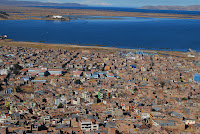 ca. We were somewhat sad on the way because we knew tha
ca. We were somewhat sad on the way because we knew tha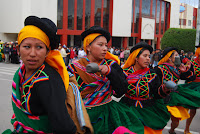 t we have reached the last city in Peru before we were to cross to Bolivia, and Peru has given us such rich experiences (including the ceviche, which we were determined to indulge in one more time before leaving Peru!).
We were grateful for the Herstories we were able to
t we have reached the last city in Peru before we were to cross to Bolivia, and Peru has given us such rich experiences (including the ceviche, which we were determined to indulge in one more time before leaving Peru!).
We were grateful for the Herstories we were able to  document throughout our journey in this vast country. In Puno, we were looking forward to continuing making new connections and to expand the MUCOV Proyect. As our bus curved its long metal body down the road towards Puno, the sight of Titicaca´s diamond like reflection greeted us like an oasis in the desert greets a thirsty womyn after a long and strenuous journey.
Puno is a small city
document throughout our journey in this vast country. In Puno, we were looking forward to continuing making new connections and to expand the MUCOV Proyect. As our bus curved its long metal body down the road towards Puno, the sight of Titicaca´s diamond like reflection greeted us like an oasis in the desert greets a thirsty womyn after a long and strenuous journey.
Puno is a small city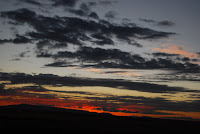 with a big heart; its streets consist of long narrow sidewalks c
with a big heart; its streets consist of long narrow sidewalks c riss-crossing a few central streets and plazas in a maze like pattern. Despite its small size, it is an impressive city full of artists, restaurants with a lunch menu of big fried trout, treats and goodies of all kinds (including our favorite new flavor of ice-cream, Lucuma, originally a yellow-orange colored fruit with a unique flavor), noisy traffic and womyn selling bread, eggs, fruits, vegetables and traditional alpaca sweaters.
riss-crossing a few central streets and plazas in a maze like pattern. Despite its small size, it is an impressive city full of artists, restaurants with a lunch menu of big fried trout, treats and goodies of all kinds (including our favorite new flavor of ice-cream, Lucuma, originally a yellow-orange colored fruit with a unique flavor), noisy traffic and womyn selling bread, eggs, fruits, vegetables and traditional alpaca sweaters.
It seems that every day was a cause for celebration in Puno; it is not in vain that this city is known as th e center of the folkloric culture and dance of Peru. About three times a week you could walk through its streets and hear the sounds of festive bands walking behind a colorful diversity of dancers in their traditional clothes for this or that dance
e center of the folkloric culture and dance of Peru. About three times a week you could walk through its streets and hear the sounds of festive bands walking behind a colorful diversity of dancers in their traditional clothes for this or that dance 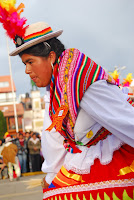 of the high
of the high lands or lowlands or the Amazon or sierras or the coast of Peru. For us, it was a perfect opportunity to document the people of Peru at their most celebratory and festive mode: smiling, dancing, li
lands or lowlands or the Amazon or sierras or the coast of Peru. For us, it was a perfect opportunity to document the people of Peru at their most celebratory and festive mode: smiling, dancing, li stening and wearing an overall sense of pride in the richness of their traditions. We visited some of the surrounding islands and got to learn a bit more about Lake Titicaca’s long history and its troubled present. The diversity of womyn in Peru’s border with Bolivia includes island womyn who often come with their families or on their own to work on the mainland of Puno and then go back to one of the islands spread throughout Lake Titicaca.
stening and wearing an overall sense of pride in the richness of their traditions. We visited some of the surrounding islands and got to learn a bit more about Lake Titicaca’s long history and its troubled present. The diversity of womyn in Peru’s border with Bolivia includes island womyn who often come with their families or on their own to work on the mainland of Puno and then go back to one of the islands spread throughout Lake Titicaca.
Our  experienc
experienc e in Puno was short but very informative. It was in Puno where MUCOV had the pleasure of getting to know many incredible womyn and two of them who wanted to participate in the proyect. Needless to say that our encounter was achieved through the usual combination of randomness and luck.
e in Puno was short but very informative. It was in Puno where MUCOV had the pleasure of getting to know many incredible womyn and two of them who wanted to participate in the proyect. Needless to say that our encounter was achieved through the usual combination of randomness and luck.
Patty Supo: A cheerful womyn with a great generous spirit and capacity to love and help the world that people tend to tell her that she is an overly trusting person. With a sincere smile and a tender reflection in her eyes she told us of her life and recounted the constant responsibility and care she feels for her younger sisters. Paty, who from a young age decided to go out and get to know the world outside of her birth town, ended up finding a home in Puno. She currently owns a little art shop and sells a variety of jewelry and fabrics that she herself crotchets. Always willing to reach out a helping hand to whomever is in need of one; Patty opened the doors of her life to us and shared her feelings and perspectives with us.
Crislee Lopez: From an early age, Crislee has been a very active girl with a great gift expressed through her evident high intelligence. In the midst of the personal, social and global challenges this young womyn finds herself experiencing in her daily life, is a great infusion of perseverance, conviction and strength that cannot be broken neither by the doubts the world puts along her way nor by the harshest of her critics.
A cheerful womyn with a great generous spirit and capacity to love and help the world that people tend to tell her that she is an overly trusting person. With a sincere smile and a tender reflection in her eyes she told us of her life and recounted the constant responsibility and care she feels for her younger sisters. Paty, who from a young age decided to go out and get to know the world outside of her birth town, ended up finding a home in Puno. She currently owns a little art shop and sells a variety of jewelry and fabrics that she herself crotchets. Always willing to reach out a helping hand to whomever is in need of one; Patty opened the doors of her life to us and shared her feelings and perspectives with us.
Crislee Lopez: From an early age, Crislee has been a very active girl with a great gift expressed through her evident high intelligence. In the midst of the personal, social and global challenges this young womyn finds herself experiencing in her daily life, is a great infusion of perseverance, conviction and strength that cannot be broken neither by the doubts the world puts along her way nor by the harshest of her critics.
At her 15 years of age she has already worked in the radio, on television, and has initiated a campaign to promote the conservation of Lake Titicaca and our environment. Crislee told us of the acute si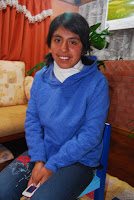 tuation Lake Titicaca has become a victim to. Extending at 3,800 meters above sea level, this vast lake is home to a diverse number of island communities and various species of birds and fish, many of which are in the process of extinction. With sadness, Crislee said that the lake will most likely not exist for our future generations to grow with, take care of and admire. She told us of the contamination the lake has been suffering in the form of trash, human waste due to the common causes of contamination and pollution: people take for granted what they have and the lack of information and resources perpetrates the cycle of violence against our planet. With a bit of rage mixed with indignation Crislee explained how traditionally many communities burn the hay kno
tuation Lake Titicaca has become a victim to. Extending at 3,800 meters above sea level, this vast lake is home to a diverse number of island communities and various species of birds and fish, many of which are in the process of extinction. With sadness, Crislee said that the lake will most likely not exist for our future generations to grow with, take care of and admire. She told us of the contamination the lake has been suffering in the form of trash, human waste due to the common causes of contamination and pollution: people take for granted what they have and the lack of information and resources perpetrates the cycle of violence against our planet. With a bit of rage mixed with indignation Crislee explained how traditionally many communities burn the hay kno wn as ¨Totora¨, but that today it is practiced without a purpose and that burning this plant highly affects the native flora and fauna. Crislee explained that, “People cannot bathe along the lake’s coasts any longer because it is dirty. And the accumulation of sediments of contamination found in the bottom of the sea prevents the sun from reaching the species of plants and fish down there, inhibiting a full process of photosynthesis. This has very bad consequences.¨
Crislee described to us the hardships she has encountered in fighting to preserve the environment bec
wn as ¨Totora¨, but that today it is practiced without a purpose and that burning this plant highly affects the native flora and fauna. Crislee explained that, “People cannot bathe along the lake’s coasts any longer because it is dirty. And the accumulation of sediments of contamination found in the bottom of the sea prevents the sun from reaching the species of plants and fish down there, inhibiting a full process of photosynthesis. This has very bad consequences.¨
Crislee described to us the hardships she has encountered in fighting to preserve the environment bec ause this fight does not interest neither adolescents nor adults: ¨People have no interest and we have to figure out different ways in which to call their attention. Between sports, English classes, the radio, school, and hobbies such as chess competitions and mathematics, Crislee does not prioritize one activity over the other given that she manages do fit-it-all into one day! ¨It has become easy for me because I feel as if I have many worlds inside my world and I always need to notice what environment I am in and from there place myself in a certain context. Many people my age don’t think like me, and so I look for strategies in order to be able to think like them and in this way not go against the current or the world.¨
P.S – About the title (and Titles)
For all we know young single womyn have been called Miss (or Señorita in Spanish) for ages. We noticed once we entered Peru that people, more often men, would refer to us as Miss Mayra or Miss Carolina o
ause this fight does not interest neither adolescents nor adults: ¨People have no interest and we have to figure out different ways in which to call their attention. Between sports, English classes, the radio, school, and hobbies such as chess competitions and mathematics, Crislee does not prioritize one activity over the other given that she manages do fit-it-all into one day! ¨It has become easy for me because I feel as if I have many worlds inside my world and I always need to notice what environment I am in and from there place myself in a certain context. Many people my age don’t think like me, and so I look for strategies in order to be able to think like them and in this way not go against the current or the world.¨
P.S – About the title (and Titles)
For all we know young single womyn have been called Miss (or Señorita in Spanish) for ages. We noticed once we entered Peru that people, more often men, would refer to us as Miss Mayra or Miss Carolina o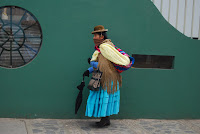 r Miss Malinche. This caught us by surprise as we were not used to such formalities and more so, we felt confused as to how they knew were Señoritas still?
This new addition to our name had brought about many thoughts in us: How can anyone tell whether we are married or not? And why is it even important to refer to a womyn as Miss? Or Mrs. (Señora)? And why isn’t there Mrs. version to Mr. I am now married? Whereas a womyn is marked by her age and marital status? We started questioning whether there were any advantages that came with these titles; in truth, we could not find any. But Malinche did have her own reflection on the subject:
¨Why does society have to mark my name and superimpose it onto a time and a space that is constructed as a result of the differences between men and womyn, womyn and womyn, and that difference transcends with age?¨ And this was the beginning of the…
r Miss Malinche. This caught us by surprise as we were not used to such formalities and more so, we felt confused as to how they knew were Señoritas still?
This new addition to our name had brought about many thoughts in us: How can anyone tell whether we are married or not? And why is it even important to refer to a womyn as Miss? Or Mrs. (Señora)? And why isn’t there Mrs. version to Mr. I am now married? Whereas a womyn is marked by her age and marital status? We started questioning whether there were any advantages that came with these titles; in truth, we could not find any. But Malinche did have her own reflection on the subject:
¨Why does society have to mark my name and superimpose it onto a time and a space that is constructed as a result of the differences between men and womyn, womyn and womyn, and that difference transcends with age?¨ And this was the beginning of the…
The Miss Señorita Rampage
“What? What was that Malinche?” was the only thing we managed to say when Malinche decided to continue her tirade: “What I am trying to say is that my name is just Malinche. If I am young and single my name continues to be Malinche, if I do not get married my name is still Malinche, if I marry and then divorce I still continue to be Malinche and if I reach my 40´s or 50´s I am still, again, Malinche! Who invented the whole process of naming the stages of our lives and the aging of our bodies based on titles? We go form baby, to girl to Miss and if you marry a man you go straight to the Mrs. which is the worse one because womyn invisibilize their own last name and are branded with that of their husband’s. What purpose does this have in our 21st century? As for me, I say just call me Malinche and save the trouble of those unnecessary patriarchic formalities of measuring my body according to my age within the frame of my civil state and my wrinkles.”
And she continued on for another 40 minutes explaining her stance…
just Malinche. If I am young and single my name continues to be Malinche, if I do not get married my name is still Malinche, if I marry and then divorce I still continue to be Malinche and if I reach my 40´s or 50´s I am still, again, Malinche! Who invented the whole process of naming the stages of our lives and the aging of our bodies based on titles? We go form baby, to girl to Miss and if you marry a man you go straight to the Mrs. which is the worse one because womyn invisibilize their own last name and are branded with that of their husband’s. What purpose does this have in our 21st century? As for me, I say just call me Malinche and save the trouble of those unnecessary patriarchic formalities of measuring my body according to my age within the frame of my civil state and my wrinkles.”
And she continued on for another 40 minutes explaining her stance…

that's been a long standing debate between me and my friends... and there's no spanish equivalent to Ms.
ReplyDelete